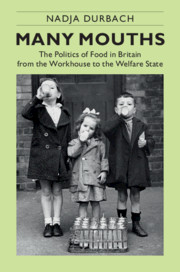Book contents
- Many Mouths
- Many Mouths
- Copyright page
- Dedication
- Contents
- Figures
- Acknowledgments
- Introduction
- 1 Old English Fare
- 2 Gendered Portions and Racialized Rations
- 3 Famine, Cooked Food, and the Starving Child
- 4 Tommy’s Tummy
- 5 The Science of Selection
- 6 Every Sort and Condition of Citizen
- 7 Nations Out of Nurseries, Empires into Bottles
- Conclusion
- Notes
- Bibliography
- Index
5 - The Science of Selection
Malnutrition and School Meals in the Interwar Years
Published online by Cambridge University Press: 27 March 2020
- Many Mouths
- Many Mouths
- Copyright page
- Dedication
- Contents
- Figures
- Acknowledgments
- Introduction
- 1 Old English Fare
- 2 Gendered Portions and Racialized Rations
- 3 Famine, Cooked Food, and the Starving Child
- 4 Tommy’s Tummy
- 5 The Science of Selection
- 6 Every Sort and Condition of Citizen
- 7 Nations Out of Nurseries, Empires into Bottles
- Conclusion
- Notes
- Bibliography
- Index
Summary
Chapter 5 explores conflicts over the provision of school meals during the interwar period. It discusses the public’s resistance to school meals as a legacy of stigmatizing forms of government relief. However, its main focus is on a 1934 policy shift whereby the Board of Education instructed local education authorities to focus their feeding efforts on schoolchildren suffering from malnutrition rather than feeding poor children “indiscriminately.” These pupils were to be identified, the Board mandated, through a process of clinical examination rather than by assessing their parents’ income. This was not matched, however, by any attempt to ameliorate the quality of school meals themselves. Despite considerable advances in the study of nutrition in the interwar period, the Board of Education rarely interfered in local decisions about the components of the meals. This chapter demonstrates that the government’s policy of “medical selection” paired with its lack of commitment to standardizing the nutritional requirements of school meals undermined any stated goal to address malnutrition. This was not lost on proponents of “economic selection” who successfully argued that using an income scale was instead a more objective and humane method of serving the needs of the nation’s most vulnerable citizens.
Keywords
- Type
- Chapter
- Information
- Many MouthsThe Politics of Food in Britain from the Workhouse to the Welfare State, pp. 146 - 177Publisher: Cambridge University PressPrint publication year: 2020



